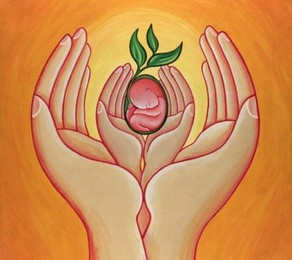|
By: Brenna Cussen Anglada  “I urge the advocates of artificial methods[of birth control] to consider the consequences. Any large use of the methods is likely to result in the dissolution of the marriage bond and in free love.” -Mahatma Gandhi, 1925. The recent celebration of the Christmas season has been another poignant reminder for us that since God has become incarnate by entering the material world as a human person, our bodies, as well as all of God’s creation, are holy. As a farmer, I can look out on our bountiful gardens (now in the dormant season, recuperating under piles of snow and hay), the cows in the pastures, the trees in the forest, the creeks that trickle by our window in dry periods and rage and threaten to overtake our home during rainstorms – and I stand in awe at both the beauty in the rhythm of the seasons and the power of God’s natural world. As a woman, I experience the rhythm of my own cycle of fertility, recognizing when my body is ready to create and nurture life, and when it is resting from such a responsibility – and I stand in awe at both the beauty and the powerful capacity God has entrusted to the female form. My husband and I, both because of our respect for the female body and our respect for the ability for the sexual union of a man and woman to generate life, have decided to practice fertility awareness. Through paying attention to my daily temperatures and other physical signs, we have become aware of the fertile and infertile times of my menstrual cycle. We work with the rhythms of my body so that we are aware when a sexual act is likely to result in pregnancy, and when it is not. Understanding our own rhythms empowers us to be able to cooperate with nature, rather than leave the care of my sexuality up to the products of a pharmaceutical company, which, in order to make a profit, would convince me that a certain dose of chemicals would “cure” me of my fertility “problem.” They sell contraceptive pills that falsify the cycles of a woman’s body in such a way that she never needs to be aware – and in fact is never allowed to be aware – of her own fertility. (Not to mention the fact that all contraceptive pills have the potential to, and often do,cause abortions.) Wendell Berry speaks of this phenomenon in his essay, “The Body and the Earth,” where he relates the fertility of women to the fertility of the land: Simply because it became possible – and simultaneously profitable – we have cut the cultural ties between sexuality and fertility, just as we have cut those between eating and farming. By ‘freeing’ food and sex from worry, we have also set them apart from thought, responsibility, and the issue of quality…The pharmacist or the doctor will look after the fertility of the body, and the farming experts and agribusinessmen will look after the fertility of the earth… It is, in effect, to remove from consciousness the two fundamental issues of human life. It permits two great powers to be regarded and used as if they were unimportant.1 In a technological society where we have allowed machines to mediate many of our relationships – to education, to nature, and to each other – fertility awareness is one way we can regain an authentic, unmediated relationship with our own bodies. A common critique of modern technology is that it breaks down communication. Practicing fertility awareness, on the other hand,necessitates communication between sexual partners so that both are aware of the woman’s stage in her menstrual cycle. The partners are compelled to have continuing conversations about their openness to conceiving children at that point in their lives, a discussion that naturally leads to other important topics, such as life goals, vocations, emotional states, and physical changes – the substance behind a healthy relationship. Many practitioners of fertility awareness who, for many reasons stated above, do not wish to control or medically alter the female menstrual cycle, but still wish to prevent pregnancy, will still employ during the female’s fertile times the use of a “barrier method” of birth control, such as condoms, diaphragms, sponges, or jellies. My husband and I have decided against these methods, refusing to allow a corporation to usurp any role in our physical relationship, leaving that as a sacred way for us to be alone together. We instead practice Natural Family Planning (NFP), the method of fertility awareness promoted by Catholics, which urges abstinence during a female’s fertile times (if a married couple, for serious reasons, is trying to temporarily avoid pregnancy.) We believe that during the marital act, when we unite physically, as well as in every other way, it is meant to be a total giving of one to the other. So to block that physical union by using rubber, foam, jelly, or any other synthetic material (especially one made in a factory, marketed, and sold to us in sleek packages), would be, for us, rendering the union incomplete. We recognize our bodies, along with our minds and spirits, to be an integral part of our personhood; and just as we do not want to hold anything back from one another emotionally or spiritually, neither do we want to hold back any part of ourselves physically. Many are rightly troubled by our current over-abundant human population, and do not want to take chances with what they believe would be an irresponsible contribution to the destruction of the planet (though I would probably agree with those who believe it is over consumption, and not overpopulation, that poses the biggest threat to the environment.) Others have legitimate health and financial concerns that could make bringing a new child into the world a hardship. While I take these worries seriously, I don’t believe they are strong enough to claim a “necessity” for artificial birth control, any more than I believe that television is a “necessity” for child-care. Practicing awareness of one’s fertility, while possibly less convenient, is as effective, if not more, of a method than any drug or synthetic fiber you can put in or on your body. Wendell Berry, in the same essay quoted above, speaks of a “natural form of birth control” practiced by the Hunza people of northern Pakistan, as reported in a National Geographic article. The author of the article interviewed a woman living in the harsh climate of the Karakoram Mountains whose children were each spaced four to five years apart: “We leave our husband’s bed until each child is weaned,” she explained. Sexual restraint, not consumption of technology, was her people’s response to their agricultural, ecological, and financial limits. The self-proclaimed “neo-luddite” and outspoken critic of technology Chellis Glendinning includes contraceptives among the technologies that have severely wounded people in modern society. In her book My Name is Chellis and I’m in Recovery from Western Civilization, Chellis speaks of natural forms of family planning found in hunter-gatherer tribes before the advent of agriculture. One of these methods is long-term breast-feeding, which, she says, “not only provided the nurturance necessary for the child’s physical and psychological development, but [could] trigger the secretion of a pituitary hormone that suppresses the mother’s menstrual cycle.”2 Breast-feeding was not the only secret to a small tribal population growth, however. Glendinning also attributes the high-protein diets and strenuous physical activity of a gatherer’s lifestyle, which resulted in extremely lean bodies, to a less frequent menstruation cycle in the female body. She estimates that during the fertile time of their lives, women gave birth once every five, six, or seven years.3 More important than comparing the “effectiveness” of different family planning methods, however, is the recognition that God – not human beings, and certainly not “Trojan” or “Norplant,” or any other for-profit corporation – is the ultimate author of life. In our modern technological age of individual choice, we have come to expect that we (with assistance from the consumer culture, of course) should always be the deciding voice about every aspect of our lives. We want to decide not only what clothes we wear, what job we have, and where we live, but also now what foods we eat and when we eat them (no matter what season it is or how many thousands of miles they have to travel to come to our table), and whether we have children and how many children we have and when we have them4 (not to mention what gender they are or what eye color they have.) Every act of sexual union brings with it the possibility for new life, and the Christian belief is that every human being conceived in this world is a unique and incarnate expression of God’s image. Who are we to doubt that this new life is a gift to us and to the Earth, or to demand that this gift be given to us on our own terms, even when those terms seem to us to be the most financially sound or “ecologically-friendly”? Perhaps instead of clinging onto what our “civilized” minds see as the most responsible choice, we should allow God’s providence to have more of a say in the outcome of our sexuality. 1 Berry, Wendell. “The Body and the Earth,” The Art of the Commonplace, Counterpoint Press, 2002. pp. 128-129 2 Long-term in this case could mean three or four years of on-demand breast-feeding. 3 Glendinning, Chellis. My Name is Chellis and I’m in Recovery from Western Civilization, Shambhala Publications, 1994. pp. 51-52. 4 I am aware of at least one couple who induced labor on December 31st in order to get a tax break for that year.
Comments
|
Disclaimer
The viewpoints expressed in each reader-submitted article are the authors own, and not an “official Jesus Radicals” position. For more on our editorial policies, visit our submissions page. If you want to contact an author or you have questions, suggestions, or concerns, please contact us. CategoriesAll Accountability Advent Anarchism Animal Liberation Anthropocentrism Appropriation Biblical Exegesis Book Reviews Bread Capitalism Catholic Worker Christmas Civilization Community Complicity Confessing Cultural Hegemony Decolonization Direct Action Easter Economics Feminism Heteropatriarchy Immigration Imperialism Intersectionality Jesus Justice Lent Liberation Theology Love Mutual Liberation Nation-state Nonviolence Occupy Othering Pacifisim Peace Pedagogies Of Liberation Police Privilege Property Queer Racism Resistance Resurrection Sexuality Solidarity Speciesism Spiritual Practices Technology Temptation Veganism Violence War What We're Reading On . . . White Supremacy Zionism ContributorsNekeisha Alayna Alexis
Amaryah Armstrong Autumn Brown HH Brownsmith Jarrod Cochran Chelsea Collonge Keith Hebden Ric Hudgens Liza Minno Bloom Jocelyn Perry Eda Ruhiye Uca Joanna Shenk Nichola Torbett Mark VanSteenwyk Gregory Williams Archives
October 2017
|
Search by typing & pressing enter


 RSS Feed
RSS Feed